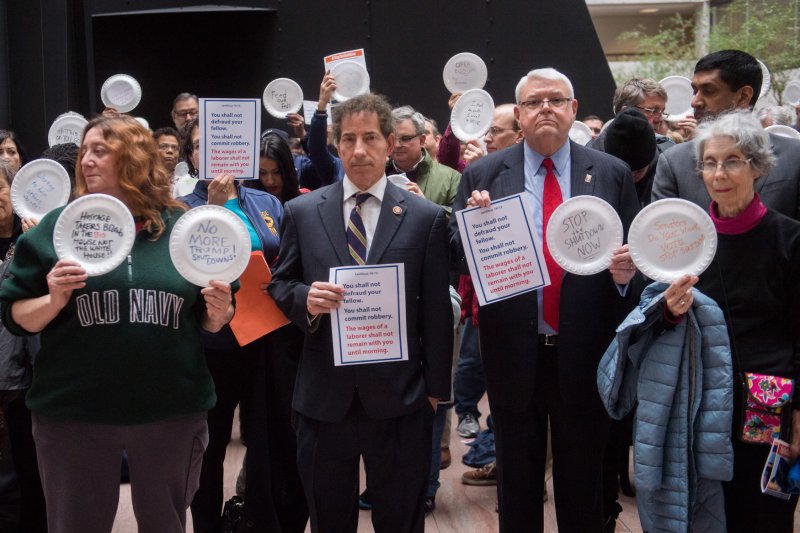Rep. Jamie Raskin, D-Md., joins furloughed government workers and their supporters as they protest the federal government shutdown on Capitol Hill on Wednesday. The paper plates symbolize the struggle to feed their families without pay. Photo by Kevin Dietsch/UPI |
License Photo
Make no mistake. Even though there has been a temporary reopening of government, the partial government shutdown is a national emergency. The emergency is not over funding for a "wall," or a crisis on the southern border. As Texas Republican House member Will Hurd, whose constituency is on the border, pointedly observed, "There is no crisis." He is correct.
Yet there is another, far greater crisis facing the nation. And there may not be a solution after Feb. 15, when the resolution to keep government open expires. This emergency is another shutdown that will stifle the economy; do great harm to government employees who are unpaid; lead to the deaths of Americans dependent on government for money, support and safety; and, worse, jeopardize the nation's overall security -- besides making us look foolish.
That the president is seen as "caving" and House Speaker Nancy Pelosi viewed as "winning" this shutdown is misleading. This crisis is not over and both sides bear responsibility. Whether a compromise can be reached is still uncertain.
In this titanic struggle, new four- and six-letter epithets have joined the incendiary lexicon over stopping illegal immigration. "Wall" is red meat for the president's base and a red flag for Democrats to rally round. "Asylum" is anathema to the base.
President Donald Trump's governing strategy depends on maintaining his base. Hence "w" is repeated loudly and the "a" word not at all. As long as the views of unelected right-wing ideologues such as Rush Limbaugh and Ann Coulter are heeded by the president, and opposed by those who put nation before ideology, the shutdown will persist.
Meanwhile, 800,000 unpaid government workers and perhaps a million other government contractors suffered. Thus far, fortunately, protests have been largely non-violent. However, if a second shutdown occurs, unpaid employees may have no redress except to take stronger action.
In 1995, the Alfred P. Murrah Federal Building in Oklahoma City was obliterated by Timothy McVeigh and his deranged view that the only way to change an evil government was to destroy it. The law of statistics suggests that perhaps a handful of this unpaid cohort of nearly 2 million Americans could see violence as the only means of getting people back to work. Whether an act as or more destructive than Oklahoma City could conceivably occur is not the point. The point is that desperation is a powerful motivator.
This analogy is imperfect. The first known female Palestinian suicide bomber was Wafa Idris. She was an attorney from a prominent and successful Palestinian family. However, her husband and much of her family were killed by the Israelis for whatever reason. Idris was desperate. The ultimate step was to don a suicide vest.
That violence did not occur yet is a tribute to these 800,000 whose patience must be exhausted. And it may not if a second shutdown occurs. However, given the history of violence that dates back more than a century to labor unions and strikes and the use of force against both, that legacy cannot be easily forgotten.
Here are three actions Congress can take in separate or a single bill over the next three weeks. First, Congress can authorize pay for all government employees, regardless of whether appropriations laws are enacted. Government may not have any money to operate or to pay utility and other bills. At least people will not suffer financially.
Second, Congress can authorize repaying interest fees for those employees forced to take out loans. While the opportunity for misuse and fraud are real, this is a minimum act of fairness. And one wonders why banks have not made low-interest loans available to qualified government employees.
Third, and most importantly, Congress can declare a national emergency -- not over the wall, but because the nation and its citizenry are being put to extreme risk by shutdowns -- to assure government remains open. These measures, while temporary, will not repair the political differences between both parties. While it is not certain the president would sign these bills, presumably, each could be passed with a veto-proof majority.
The greatest threat to the nation is not a revanchist Russia or an aggressive China. Nor is it radical and violent Islam or growing autocratic populism in Europe. Yes, the mounting national debt is a Damoclean sword. And Brexit could disrupt the Atlantic alliance.
Still, the greatest danger is failed and failing government. And the past partial shutdown is the most vivid example of this failure.
Harlan Ullman is UPI's Arnaud de Borchgrave Distinguished Columnist. His latest book is "Anatomy of Failure: Why America Has Lost Every War It Starts." Follow him @harlankullman.















